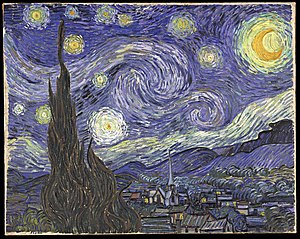remembering
Remembering your scent, wherever I saw a flower,
I smelled it and tears began to pour.
Wherever I saw a cypress in the meadow,
I kissed its feet in memory of you.
#1176: From Rumi's Kolliyaat-e Shams-e Tabrizi
Search word: remember
The idea of remembrance returned to mind this morning as I recalled yesterday's Feynman passage in which remembering is the key to a stable, consistent, enduring pattern of dance in the mind. The word remember stems from memor "mindful", from PIE base *men-/*mon- "think." (See fuller etymology here.) Thinking and remembering are therefore almost synonymous.
(Marcel Proust's Remembrance of Things Past is an obvious connection to today's verse but I've not read him myself and cannot comment knowledgeably.)
I went in search of a good picture of a cypress tree and ended up with some interesting associations, best illustrated by one of the most famous paintings of our time.
The associations of some trees are ineffaceable. Though neither in form nor in color has the Cypress any suggestion of grief or gloom to the dweller in northern Europe who may be ignorant of its name and history, the customs and language of ages have, in its own southern climes, indelibly impressed upon it the symbolism of bodily death and spiritual immortality.
The Cypress (Cupressus sempervirens) is generally a flame-shaped, tapering, cone-like tree, with but a short stem below its branches, which rise erectly and close to the trunk.
source

Van Gogh: Starry Night @ en.wikipedia.org
For Rumi, then, Shams represented the eternal soul, what remains when the body dies. He often referred to Shams as Sun, which is Sol in Latin and the masculine component of the Sol et Luna alchemical pair. Sol and soul have no etymological connection but they resonate together to the ear.
Certainly, the impact we have had on one another, what people remember of us after we die, this is the fullest expression of our individual imprint on life's evolution. This idea is at the very core of the Christian ritual of communion and the key to each of our immortality:
1 Corinthians 11:23-25 (KJV)
For I have received of the Lord that which also I delivered unto you, that the Lord Jesus the same night in which he was betrayed took bread:
And when he had given thanks, he brake it, and said, Take, eat: this is my body, which is broken for you: this do in remembrance of me.
After the same manner also he took the cup, when he had supped, saying, this cup is the new testament in my blood: this do ye, as oft as ye drink it, in remembrance of me.



1 Comments:
I've been fortunate enough to see Starry Night at MOMA. I haven't read Proust either. There is so much to read, and now there is more than one translation, each with its dis/advantages. I'm still slogging through the biography of Byron. About 550 pages into it so far. Not as much on the poetry as I'd like. Plus I'm in the middle of writing one poem, and preparing myself mentally for writing my once-a-year sestina. At least I have four days off in a row, starting today!
Post a Comment
<< Home